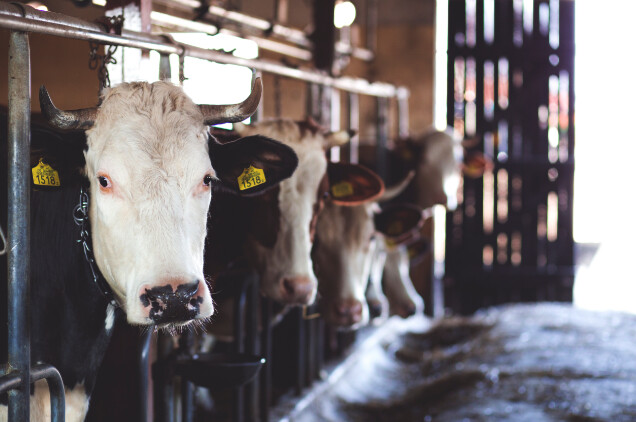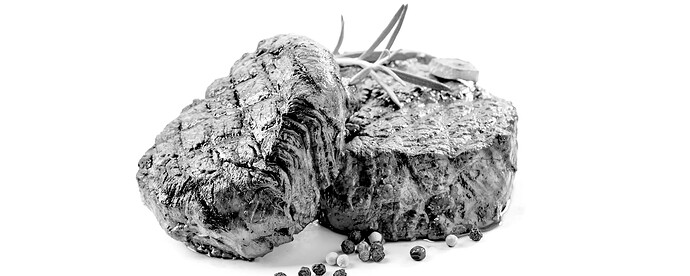“Human beings are cruel to animals in many ways.”
Many countries still don’t have strong judicial systems to protect the rights of animals.
TOP 7 ORGANIZATIONS WORKING FOR THE ANIMAL RIGHTS MOVEMENT
https://voiceofthevoiceless.org/top-7-organizations-working-for-the-animal-rights-movement/
Eat steak and save the planet
Despite breathless sensationalist media coverage, the vegan movement (or, to call it by its trendy new name, ‘going plant-based’) has still captured only a tiny proportion of the population.
Removing meat, eggs and cheese from your diet means you will have to find other sources of protein. Where, then, do the hordes of plant-based teenagers look for their non-animal protein? The answer comes almost exclusively from a single product: soy.
Soy is significant because its impact on the environment is far worse than that of any dairy farmer. Since the soil used to grow soy is often not protected by vegetation, soy production causes soil erosion, destroying topsoil, which is disastrous for plant growth. Soy also takes up a lot of land, which fuels deforestation and hurts natural ecosystems, and a lot of water, which leads to droughts. Perhaps worst of all, communities in some of the poorest parts of the world who rely on their natural surroundings to survive are displaced by large Western companies barging in to manufacture soy to sell to vegans in Europe and America.
Romans 14:17 For The Kingdom of God is not meat and drink; but righteousness, and peace, and joy in the Holy Spirit. King of kings' Bible - Romans
As the saying goes, Too much of a good thing" can be harmful.
Meat consumption can be healthful and vegan diets have shown untoward effects, but 'How Much Meat is Too Much'?
Vegan diets don't work. Here's why

Vegan diets don't work. Here's why
NAVIGATION 00:00 - Why do people get crooked teeth? 1:10 - Why do 84% of vegans quit veganism? 2:13 - Humans’ shrinking skulls 5:16 - So why can’t we replace Meat? 9:00 - Does veganism harm gut health? 14:34 - What is humans’ default diet? 19:45 - Are Humans going to end up like the cats? 26:14 - Science can save us from having to eat meat, right? 30:45 - Vegans eat more processed food. Why that’s a problem 34:37 - Is Veganism bad for kids?
WEF Orders Govt’s To Begin Putting ‘Cigarette-Style’ Warnings on Meat Products
The World Economic Forum has ordered government’s to begin putting cigarette-style warning labels on all meat products to discourage the public from consuming meat.
The new labels will read: “Warning: Eating meat contributes to climate change.”
Are you attempting "Veganuary"?
It's a yearly challenge, for people who want to give going vegan a try - cutting out animal products and taking up a plant-based lifestyle during the month of January.
Vegan business owner Romina Mayani-Nankani spoke to Jonathan Scott on Radio Gibraltar; she said it's all about individual choices.

Veganuary 2024: will you take up the challenge to cut out animal products?
Fake food
How Americans Are Tricked Into Buying Fake Food

How Americans Are Tricked Into Buying Fake Food
Florida Moves to Ban Bill Gates’ Lab-Grown ‘Meat’

Lawmakers in Florida are preparing to ban the lab-grown “meat” products from being sold in the state.
As Slay News has reported, the “synthetic meat” products, which are grown in labs to mimic beef and chicken, are heavily promoted by Microsoft co-founder Bill Gates, who has invested millions of dollars into their development.
However, amid growing safety concerns about the fake meat, Florida lawmakers are advancing a set of bills to keep the products out of the state’s food supply.
Bill HB 1071 is looking to ban the sale of “cultivated meat,” defined as “any meat or food product produced from cultured animal cells.”
The bill makes it unlawful for any individual “to manufacture for sale, sell, hold or offer for sale, or distribute cultivated meat” in Florida.
Violations will be deemed as a misdemeanor of the second degree. Food establishments that manufacture, distribute, or sell cultivated meat will be “subject to disciplinary action.”
Licenses of such establishments could also be suspended.
On Thursday, the state House of Representatives’ Infrastructure Strategies Committee advanced the bill.
Its companion bill in the Senate, SB 1084, was advanced by the Senate Rules Committee.
As such, the bills are now ready for floor votes in both chambers. If passed, Florida will become the first U.S. state to support a total ban on cultivated meat.
“I want a free market that tells me when I put a product in Publix, I know that it is safe and secure,” said Rep. Daniel Alvarez (R-FL) according to Florida Politics, referring to the grocery store chain.
The lawmaker acknowledged that the ban won’t last “forever.”
However, he said that cultured meat will take at least five years to become widely available commercially, which gives lawmakers enough time to revisit the issue when necessary.
Vegan influencer Zhanna Samsonova 'dies of starvation' after decade of only eating raw fruit and vegetables
A "raw vegan" influencer has reportedly died from starvation after a decade of only eating fruit and vegetables.
Originally from Russia, Zhanna Samsonova - known as Zhanna D'Art on social media - used Instagram, where she had more than 10,000 followers before she died, to highlight the benefits of a raw vegan diet.
Speaking to a Russian newspaper following the 39-year-old's death in Malaysia on 21 July, her mother said Samsonova died from a "cholera-like infection" that was made worse by her restrictive diet.
Her official cause of death has not been revealed, but her friends had expressed worries about her extreme style of veganism to local media.
One friend told 116.ru: "Ms Samsonova's idle starvation was causing her to melt before our eyes, but she believed everything was fine.
"Only her eyes, merry eyes, and gorgeous hair compensated for the dreadful sight of a body tortured by idiocy. Forgive me if it sounds harsh."
Another added: "I lived one floor above her and every day I feared finding her lifeless body in the morning. I convinced her to seek treatment, but she didn't make it."
Friends also said she refused to get medical attention before her death, and described how she was bed bound and struggled to walk, according to local media.
They also claimed she had not drunk any water for six years, choosing instead to drink fruit and vegetable juice.
Quotes from the above post, by the Gibraltar Messenger:
Humans are omnivores, not herbivores or carnivores, but a combination of both because the human body needs both.
That is why in The Law (Deuteronomy 14) you are told what you can eat and what you cannot eat.
You were given God's Law to keep you healthy and and the environment pristine.
You break it at your own peril and destruction.
Why Animal Foods Are Essential for Brain Health
Experts weigh in on plant-based diets and brain health, exploring essential nutrients and striking a balance with animal foods.
Colorful fruits and vegetables are dietary superheroes—no doubt about that. But a growing number of experts are saying that forsaking all animal products could starve the brain of crucial nutrients.
Strictly vegan regimes lack nutrients such as complete proteins, certain healthy fats, zinc, and iron, and may fail to adequately nourish the brain, potentially hampering mood, memory, and cognitive prowess.
Missing Nutrients
The deterioration in mental health over the past 75 years correlates with a decline in dietary quality, according to Dr. Georgia Ede, a Harvard-trained psychiatrist specializing in nutrition science and brain metabolism and author of “Change Your Diet, Change Your Mind.”
Both animal- and plant-based foods play a role in optimizing brain health, Shani La Grange, a registered dietitian, told The Epoch Times. Fiber intake is as important as protein intake to encourage the production of serotonin, which is important for several body functions, including mood stabilization, cognition, learning, and memory, she added. Fiber found in plant-derived foods stimulates the production of short-chain fatty acids, which, in turn, stimulates the production of serotonin.
A higher intake of plant-based foods could also promote a more anti-inflammatory effect, which could promote healthy brain aging and decrease the risk of certain conditions like dementia.
However, Ms. La Grange said that strict plant-based diets pose a risk of vitamin B12 and iron deficiency (if not supplemented), which could be detrimental to neurological and cognitive health and could impair cognitive functioning.
Besides micronutrients, animal-derived fats and proteins are optimal for human physiology and structure, Dr. Natasha Campbell-McBride, a medical doctor with postgraduate degrees in neurology and human nutrition, wrote in her book “Vegetarianism Explained.” Her research suggests that fat and protein are the primary constituents of the human body after water, serving as vital building blocks for organs, bones, muscles, and the brain.
While a well-planned, adequately supplemented vegetarian diet with whole foods and eggs may support brain health, vegan diets pose nutritional deficiencies that are difficult to overcome even with careful supplementation, Dr. Ede said. The risks to mental health hinge on how plant-based diets are constructed.
For any diet to be “brain-healthy,” it must accomplish three objectives, according to Dr. Ede:
- To nourish the brain with all essential nutrients without relying on fortified processed foods or supplements, including some animal-source foods in the diet is recommended
- Protect the brain by excluding ultra-processed ingredients like refined carb
- Energize the brain by maintaining healthy blood sugar and insulin levels throughout life
The Brain’s Need for Fat
The brain is two-thirds fat, with 20 percent being the essential omega-3 fatty acid docosahexaenoic acid (DHA), which plays a crucial role in cognitive function, according to Dr. Ede.
A 2019 review in the Asia Pacific Journal of Clinical Nutrition showed DHA’s essentiality for optimal neuronal function. The Framingham Heart Study, published in 2006 in the Journal of the American Medical Association’s Archives of Neurology, revealed a notable correlation: Higher plasma DHA levels corresponded with a reduced risk of all-cause dementia. People in the top quartile of plasma DHA experienced a 47 percent decreased risk of dementia.
According to Dr. Ede, the problem is that plant-based foods lack DHA, forcing reliance solely on animal-derived sources for this vital nutrient. While plants contain the omega-3 alpha-linolenic acid (ALA), converting it into the brain-critical DHA is exceedingly difficult, if not impossible.
A clinical trial involving young adult men published in the British Journal of Nutrition found that these men exhibit very low or absent capacity to convert ALA to DHA. Further insights came from another study on healthy young women, suggesting women have a slightly greater ALA-to-DHA conversion ability than men, potentially to meet the demands of fetal development and lactation.
The American Journal of Clinical Nutrition published a study comparing omega-3 levels. It showed that DHA levels were 31 percent lower in vegetarians and 59 percent lower in vegans compared to people who ate meat.
Inefficient Absorption
There are nutritional disparities between animal-based and plant-based foods, according to Dr. Ede. Only nondairy animal foods, including meat, seafood, and poultry, provide every essential nutrient in its most bioavailable form, she noted.
In contrast, plant foods not only lack certain vital nutrients but the forms of the nutrients they contain can also pose challenges for human use, Dr. Ede said.
Plant foods contain anti-nutrients that impede our ability to absorb nutrients from both plant and animal-derived foods. “Just because a plant food contains a nutrient doesn’t mean we can access it,” Dr. Ede said.
For instance, grains, beans, nuts, and seeds are rich in phytate, an anti-nutrient known to inhibit the absorption of essential minerals such as iron, zinc, calcium, and magnesium, she noted. These minerals are crucial for various functions, including dopamine synthesis, neurotransmitter production, and energy metabolism, which are vital for optimal brain health and function.
Our eyes, brains, and immune systems rely on vitamin A for their function and structure. While plants contain carotenoids, which can be converted into retinol (the functional form of vitamin A) in a healthy body, Dr. Ede said this conversion process is challenging. Environmental toxins and nutritional deficiencies can hinder this conversion, leading to vitamin A deficiency despite one consuming carotenoid-rich plants like carrots, sweet potatoes, and kale, she added.
Enhance Nutrient Absorption in Plant-Based Diets
Prudent cooking practices, ideal food combinations, and sprouting and fermentation processes can significantly improve the bioavailability of micronutrients from plant-based foods.
Specifically, sprouting and fermentation have been shown to enhance the bioavailability of iron and beta-carotene from plant foods, according to a 2016 review published in Critical Reviews in Food Science and Nutrition.
With careful meal planning and proper supplementation, it is theoretically possible for adults following a vegan or vegetarian diet—excluding pregnant or breastfeeding women—to meet their requirements for all essential nutrients, Dr. Ede said. However, achieving this can be challenging and requires diligent effort, she added.
Finding Balance
Plants primarily function as cleansers for the body, according to Dr. Campbell-McBride.
In their natural state, plants contain detoxifying compounds that aid in the removal of harmful chemicals and toxins accumulated in our bodies. However, it’s essential to reintroduce animal-based foods after a cleanse to prevent the body from deteriorating and experiencing starvation, she said.
This doesn’t mean one should overeat meat, as that also has its downsides. Some research has linked long-term, very high intake of animal proteins—especially red meat—to suboptimal brain health. In moderation, however, protein found in animal-based products is essential to overall nutrition, Ms. La Grange said.
They've come up with a new term, buzz word, for their agenda – Flexitarian
Is Charles The Pretender A Vegetarian? – No, Charles The Pretender is not vegetarian. However, he's not meat-obsessive, either. He has previously stated that he is fish and meat-free for two days a week, and dairy-free one day a week, essentially making him a flexitarian. Flexitarianism is the practice of deliberately eating fewer animal products but not fully excluding them from your diet, and it's way more popular than you may think. Flexitarians make up 42% of consumers globally, and there's a lot of scientific evidence to support the idea that eating less meat can have a positive impact on both you and the environment. King Charles has explained that his motive for following a flexitarian diet is environmental, and he believes that if more people did this it would ease current pressures on the environment.
Charles may be a Flexitarian by choice, but many of his subjects are Pooritarians.
Pooritarianism is the practice of involuntary eating less animal, grain, fruit/veg, and legume products seven days a week; and it's more common than you may think.
"By June 2023, according to surveys from The Food Foundation, 9 million UK adults (17% of households) experienced moderate or severe food insecurity, up from 7.3% in June 2021" - Britain’s hunger and malnutrition crisis could be easily solved – yet politicians choose not to | Michael Marmot | The Guardian
In June 2023, The Trussell Trust that owns more than 1,200 food banks in the UK estimated 11.3 million people faced hunger over the course of one year. - One in seven people in UK going hungry because they can’t afford to eat | The Independent
The UK’s food poverty rate is among the highest in Europe. Despite being the sixth richest country in the world, millions are struggling to access the food they need. Most people who fall into food poverty struggle because their income is too low or unreliable. Soaring prices are affecting household budgets, which means families are increasingly experiencing food insecurity. The costs of staple items like bread, cheese and milk have skyrocketed. - Food poverty in the UK: The causes, figures and solutions
There's scientific evidence to support the idea that not eating will have a negative impact on your body's health like health issues from malnutrition.
A Pooritarian's motive for following a pooritarian diet is economic.
Some believe if Charles The Pretender followed The Law and declared a real Biblical Jubilee (Lev. 25:9-17), fogiveness of all debt and dividing the wealth, then everyone could have their own piece of land to grow their own food; and live with nature and follow the perfect healthy diet.
Lev. 25:17 Ye shall not therefore oppress one another; but thou shalt fear thy God: for I [am] the "I AM" your God.
Instead of following The Law, Charles – The Green Pretender King – is set to make billions on the Green Agenda. Charles is set to receive a major boost to his income under the guise of Net Zero (to pooritarians) because he owns all of the seabed around Britain's coastline, and that's where the wind turbines are going to be built. That 'crown estate land' just happens to include the entire British coastline with any windmill built on it paying tax to the king, in exactly the same way as British subjects did during the middle ages. – Feudalism 2.0: King Charles to Make Billions from 'Great British Energy' in New Deal Leasing the Ocean Floor
Charles takes even more - Thousands of people who died in a specific area of north-west England known as the Lancashire county palatine without leaving behind a will or a known next of kin have had their financial assets collected by the Duchy of Lancaster for Charles’ benefit’. More than £60m of “ownerless property” or bona vacantia (literally ‘vacant goods’ in English) has reportedly been scooped up by the duchy over the last decade, and used to finance renovations of the Charles' estate which he profits from renting out.
Deut. 17:16 But he shall not multiply horses to himself, nor cause the people to return to Egypt (slavery under man-made laws), to the end that he should multiply horses: forasmuch as the "I AM" hath said unto you, Ye shall henceforth return no more that way.
17:17 Neither shall he multiply wives to himself, that his heart turn not away: neither shall he greatly multiply to himself silver and gold.
Father warned us:
1 Samuel 8:6 But the thing displeased Samuel, when they said, Give us a king to judge us. And Samuel prayed unto the "I AM".
8:7 And the "I AM" said unto Samuel, Hearken unto the voice of the people in all that they say unto thee: for they have not rejected thee, but they have rejected Me, that I should not reign over them.
8:8 According to all the works which they have done since the day that I brought them up out of Egypt even unto this day, wherewith they have forsaken Me, and served other gods, so do they also unto thee.
8:9 Now therefore hearken unto their voice: howbeit yet protest solemnly unto them, and show them the manner of the king that shall reign over them.
8:10 And Samuel told all the words of the "I AM" unto the people that asked of him a king.
8:11 And he said, This will be the manner of the king that shall reign over you: He will take your sons, and appoint [them] for himself, for his chariots, and [to be] his horsemen; and [some] shall run before his chariots.
8:12 And he will appoint him captains over thousands, and captains over fifties; and [will set them] to sow his ground, and to reap his harvest, and to make his instruments of war, and instruments of his chariots.
8:13 And he will take your daughters [to be] confectionaries, and [to be] cooks, and [to be] bakers.
8:14 And he will take your fields, and your vineyards, and your oliveyards, [even] the best [of them], and give [them] to his servants.
8:15 And he will take the tenth of your seed, and of your vineyards, and give to his officers, and to his servants.
8:16 And he will take your menservants, and your maidservants, and your goodliest young men, and your asses, and put [them] to his work.
8:17 He will take the tenth of your sheep: and ye shall be his servants.
8:18 And ye shall cry out in that day because of your king which ye shall have chosen you; and the "I AM" will not hear you in that day.
8:19 Nevertheless the people refused to obey the voice of Samuel; and they said, Nay; but we will have a king over us;
It's time for The Real King Christ
Toxic Exposures
Bad Diets Kill More People Than Smoking — Yet Doctors Get Almost No Training in Nutrition
In a 2023 survey of more than 1,000 U.S. medical students, about 58% of respondents said they received no formal nutrition education while in medical school for four years. Those who did received an average of about three hours of nutrition education per year.
American cattle rancher exposing that they’ve all been sold out
American cattle rancher exposing that they’ve all been sold out, they’re at risk of being run out of business and your meat is being imported.
- 4 large mega corporations now own 85% of the entire industry.
- 2 of them are foreign owned.
- 1 of them is Chinese.







